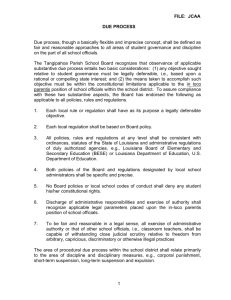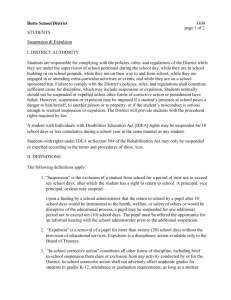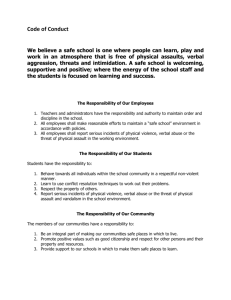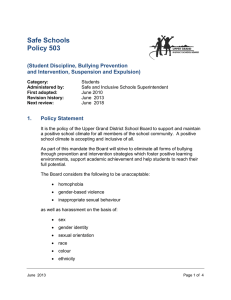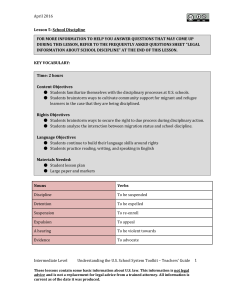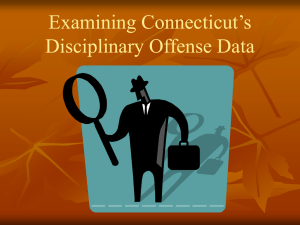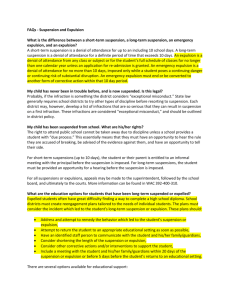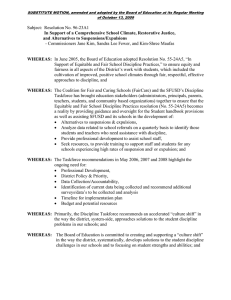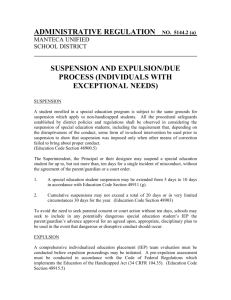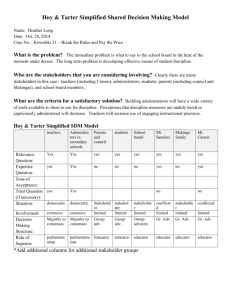Policy Summary - North Carolina Early Learning Network (NC-ELN)
advertisement
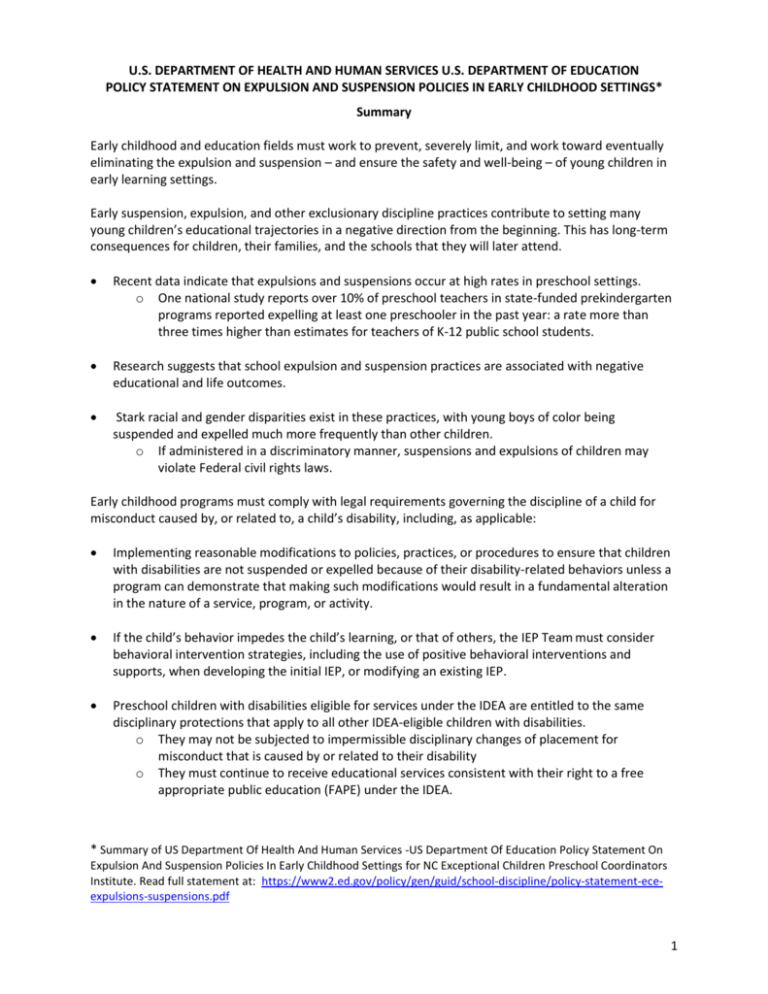
U.S. DEPARTMENT OF HEALTH AND HUMAN SERVICES U.S. DEPARTMENT OF EDUCATION POLICY STATEMENT ON EXPULSION AND SUSPENSION POLICIES IN EARLY CHILDHOOD SETTINGS* Summary Early childhood and education fields must work to prevent, severely limit, and work toward eventually eliminating the expulsion and suspension – and ensure the safety and well-being – of young children in early learning settings. Early suspension, expulsion, and other exclusionary discipline practices contribute to setting many young children’s educational trajectories in a negative direction from the beginning. This has long-term consequences for children, their families, and the schools that they will later attend. Recent data indicate that expulsions and suspensions occur at high rates in preschool settings. o One national study reports over 10% of preschool teachers in state-funded prekindergarten programs reported expelling at least one preschooler in the past year: a rate more than three times higher than estimates for teachers of K-12 public school students. Research suggests that school expulsion and suspension practices are associated with negative educational and life outcomes. Stark racial and gender disparities exist in these practices, with young boys of color being suspended and expelled much more frequently than other children. o If administered in a discriminatory manner, suspensions and expulsions of children may violate Federal civil rights laws. Early childhood programs must comply with legal requirements governing the discipline of a child for misconduct caused by, or related to, a child’s disability, including, as applicable: Implementing reasonable modifications to policies, practices, or procedures to ensure that children with disabilities are not suspended or expelled because of their disability-related behaviors unless a program can demonstrate that making such modifications would result in a fundamental alteration in the nature of a service, program, or activity. If the child’s behavior impedes the child’s learning, or that of others, the IEP Team must consider behavioral intervention strategies, including the use of positive behavioral interventions and supports, when developing the initial IEP, or modifying an existing IEP. Preschool children with disabilities eligible for services under the IDEA are entitled to the same disciplinary protections that apply to all other IDEA-eligible children with disabilities. o They may not be subjected to impermissible disciplinary changes of placement for misconduct that is caused by or related to their disability o They must continue to receive educational services consistent with their right to a free appropriate public education (FAPE) under the IDEA. * Summary of US Department Of Health And Human Services -US Department Of Education Policy Statement On Expulsion And Suspension Policies In Early Childhood Settings for NC Exceptional Children Preschool Coordinators Institute. Read full statement at: https://www2.ed.gov/policy/gen/guid/school-discipline/policy-statement-eceexpulsions-suspensions.pdf 1 RECOMMENDATIONS FOR EARLY CHILDHOOD PROGRAMS Develop and Clearly Communicate Preventive Guidance and Discipline Practices Programs should establish developmentally appropriate social-emotional and behavioral health promotion practices, and discipline and intervention procedures Discipline procedures should provide specific guidance on what teachers and programs will do, including communication with families and caregivers, and consulting with mental health specialists, school counselors, and the child’s medical home. If the child is suspected of having a developmental delay, disability, or mental health issue, refer the child’s parents to the appropriate program. Children eligible for services under Part B or C are also likely entitled to protections under Title II and Title III of the ADA. Programs must make reasonable modifications to their policies, practices, or procedures to ensure that children with disabilities are not suspended or expelled because of their disability-related behaviors. Develop and Clearly Communicate Expulsion, and Suspension Policies Clearly communicate them with all staff, families, and community partners. All programs must ensure that the policies developed are in accordance with applicable State and Federal statutes, including Federal civil rights law, IDEA, ADA, and Section 504. Access Technical Assistance in Workforce Development to Prevent Expulsion and Suspension: Teachers and staff should implement practices, strategies and procedures to: o Form strong, supportive, nurturing relationships with children; o Conduct ongoing developmental monitoring, universal developmental and behavioral screenings at recommended ages, and follow-up, as needed; o Collaborate with community-based service providers; o Form strong relationships with parents and families; o Have a strong understanding of culture and diversity; o Employ self-reflective strategies and cultural awareness training to prevent and correct all implicit and explicit biases, including racial/national origin/ethnic, sex, or disability biases; an o Eliminate all discriminatory discipline practices Set Goals and Analyze Data to Assess Progress: Programs should set goals, monitor data to assess progress, and modify practices and investments, as needed, to reach their goals Make Use of Free Resources to Enhance Staff Training and Strengthen Family Partnerships: Resources are available free of charge that can assist in preventing, severely limiting, and ultimately eliminating expulsion and suspension: o o o Stepping Stones to Caring for Our Children: National Health and Safety Performance Standards Birth to Five Watch Me Thrive materials National Center on Early Childhood Mental Health Consultation o Center for the Social Emotional Foundation for Early Learning (CSEFEL) and the Technical Assistance Center on Social Emotional Intervention (TACSEI). 2
